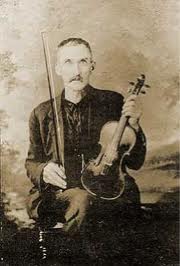Annotation:Jackson's March (2)
X:1 % T:Jackson's March [2] S:Emmett Lundy (1864-1953, Galax, Va.) M:6/8 L:1/8 N:Lundy was recorded by Alan Lomax for the Library of Congress in 1941 Z:Transcribed by Andrew Kuntz K:A e>ce e>ce|f>ef f>ec|e>ce f>ec/d/|B>AG/A/ B2c| e>fe c>BA|B>AB/d/ c>AF|E>CA, c>ec|1 A>AA A2c/e/:|2 A>AA A2E|| E>CA, E>CA,|A,2c B>AF/A/|E>CE F>EC|B,>A,B,/C/ B,2C| E>CE c>Bc|B>GB/d/ c>AF|E>CA, c>ec|1 A>AA A2{FG}F:|2 A>AA A2E||
JACKSON'S MARCH [2]. American, March (6/8 time). A Major. Standard tuning (fiddle). AA'BB'. The tune was in the repertoire of fiddler Emmett Lundy (1864-1953) of Galax, Grayson County, southwest Virginia. Lundy was recorded in the field for the Library of Congress in 1941 by Alan Lomax, including this tune. Lundy, age 77 at the time, was accompanied by his sons Kelly on guitar and vocals and Geedy on banjo. His "Jackson's March" is not the same tune as the other "Jackson's March (1)" 6/8 time melody in old-time repertory, which is a version of "Green Willis (1)," "Chapel Hill Serenade" or "Raw Recruit."

